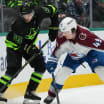2. No scoring, no chance: As hot as the Penguins were heading into the series, the Rangers had to know that unlike last season, they would need to score more than two goals per game to win the series. They averaged two goals per game. They lost in five.
The Rangers scored 10 goals in the series, including one in two games at Madison Square Garden. They got no points from Eric Staal and Ryan McDonagh.
Mats Zuccarello, New York's leading scorer in the regular season (61 points in 81 games), had a goal and an assist. He didn't have a point in the last three games.
J.T. Miller didn't score a goal, and his three assists all came in Game 2.
For Derick Brassard, the only point he had in the last three games of the series came on a secondary assist of a window-dressing power-play goal for Chris Kreider at 5:38 of the third period Saturday. That's the one that made it 6-3.
3. Power outage: The Rangers' scoring woes stemmed from their woeful power play in the series.
They went 2-for-19 on the power play, and one of them was scored at 5-on-3 in Game 1. They failed on 13 straight power plays before Kreider's goal in the third period Saturday. They also gave up a shorthanded goal in Game 1.
The Rangers had trouble on their power-play zone entries all series. When they actually did get into the zone, they had trouble setting up because of the Penguins' pressure. They didn't get enough shots either; they had 28 the entire series, eight of which came in Game 5.


















